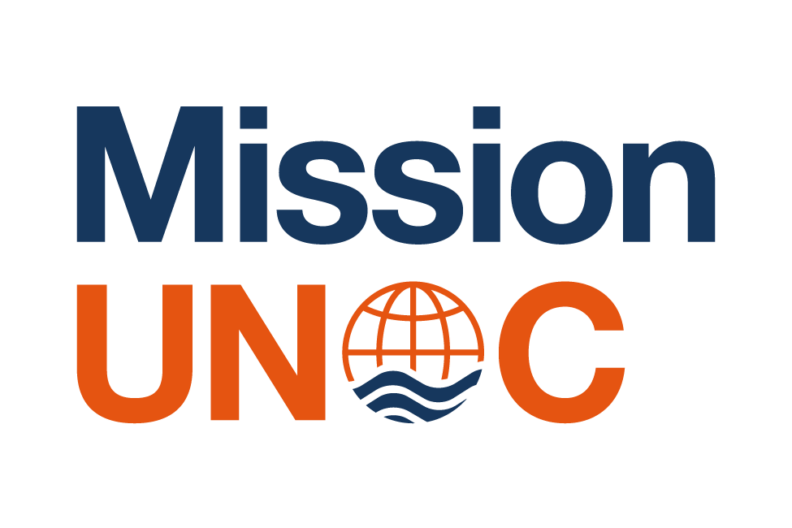Integrating the ocean into the climate regime: the Ocean & Climate Platform’s challenge
Since 2014, the Ocean & Climate Platform has been working to improve understanding and consideration of scientific work on the interactions between the ocean, climate and biodiversity by policy makers and the general public. Romain Troublé, Executive Director of the Tara Ocean Foundation is since 2017, the President of the POC.
A collective watches over the Ocean
The ocean is a key player in climate regulation. Unfortunately, it has long been absent from climate negotiations. In order to integrate the ocean into the climate regime, a group of civil society actors, with the support of the Intergovernmental Oceanographic Commission (IOC) of UNESCO, decided to create the Ocean & Climate Platform (OCP) on June 8, 2014 on the occasion of World Oceans Day.
OCP’s 3 main objectives
- Mobilizing and coordinating a network
The OCP coordinates a network of more than 90 members from various sectors (research institutes, NGOs, aquariums, private sector, French institutions and international agencies, territorial collectivities).
The collective is essential to federate the expertise on the many existing interactions between the ocean, climate and biodiversity. Multidisciplinarity and membership in the “Ocean community” are remarkable levers for civil society to define common messages and convey them together to policymakers. Allowing the “Ocean community” to speak with a united voice strengthens advocacy for protecting the ocean and its ecosystems.
- Developing and disseminating scientific knowledge
One of the OCP’s missions is to encourage the production of scientific knowledge on ocean-climate-biodiversity issues. Thus, at COP21 in 2015, the OCP was very active in supporting, alongside Monaco, France and Chile, the need for the Intergovernmental Panel on Climate Change (IPCC) to produce an ocean report as part of its 6th Assessment Report. Since 2018, the OCP has also been participating in the French government’s review of the chapters relating to the ocean in the IPCC’s Assessment Reports.
- Integrating the ocean into national and international climate policies
The OCP works towards a better inclusion of the ocean into national and international climate policies. This work was rewarded by the integration of the ocean into the Preamble to the Paris Agreement at COP21 in 2015. The OCP also issues advocacy kits for policymakers to keep raising these issues within various authorities.
The Comité France Océan (CFO, France Ocean Committee) is a coordination committee with the purpose of building a regular and productive exchange between the government, its public institutions in charge of the sea and organizations for the protection of the marine environment. At the national level, the OCP coordinates this committee around various working groups. This space of exchange allows the production of recommendations addressed directly to the French government.
On the international level, since 2020, the OCP has been the focal point for the “Ocean and Coastal Zone” within the framework of the UNFCCC’s Global Climate Action Agenda (GCAA). The OCP promotes ocean-inspired solutions to tackle climate change. The Platform has also coorganized Ocean Action Day since the COP26, held in Glasgow (2021).
In the framework of its partnership with the Because the Ocean Initiative (of which the Tara Ocean Foundation is a founding member), the OCP also encourages States to integrate ocean-related measures into their climate strategies (Nationally Determined Contributions, NDCs).
Finally, as an expert of the “Oceans, Coastal Areas and Ecosystems” group of UNFCCC’s Nairobi Work Program, the OCP draws on its members’ expertise to keep international bodies updated on ocean-inspired solutions.
Gradually, the ocean is integrated into the negotiations
Thanks to the collective, the Ocean is beginning to take its place in public and political debates. In 2015, the Ocean was integrated into the Preamble to the Paris Agreement; in 2016, it was added to the Global Agenda for Action at COP22, and in 2017, the Ocean Pathway Partnership was launched at COP23. Recently, the ocean was taken into account in final decisions at COP25 and COP26, and has been the subject of an annual ocean-climate dialog in the framework of the UNFCCC’s Subsidiary Body for Scientific and Technological Advice (SBSTA) since COP26.
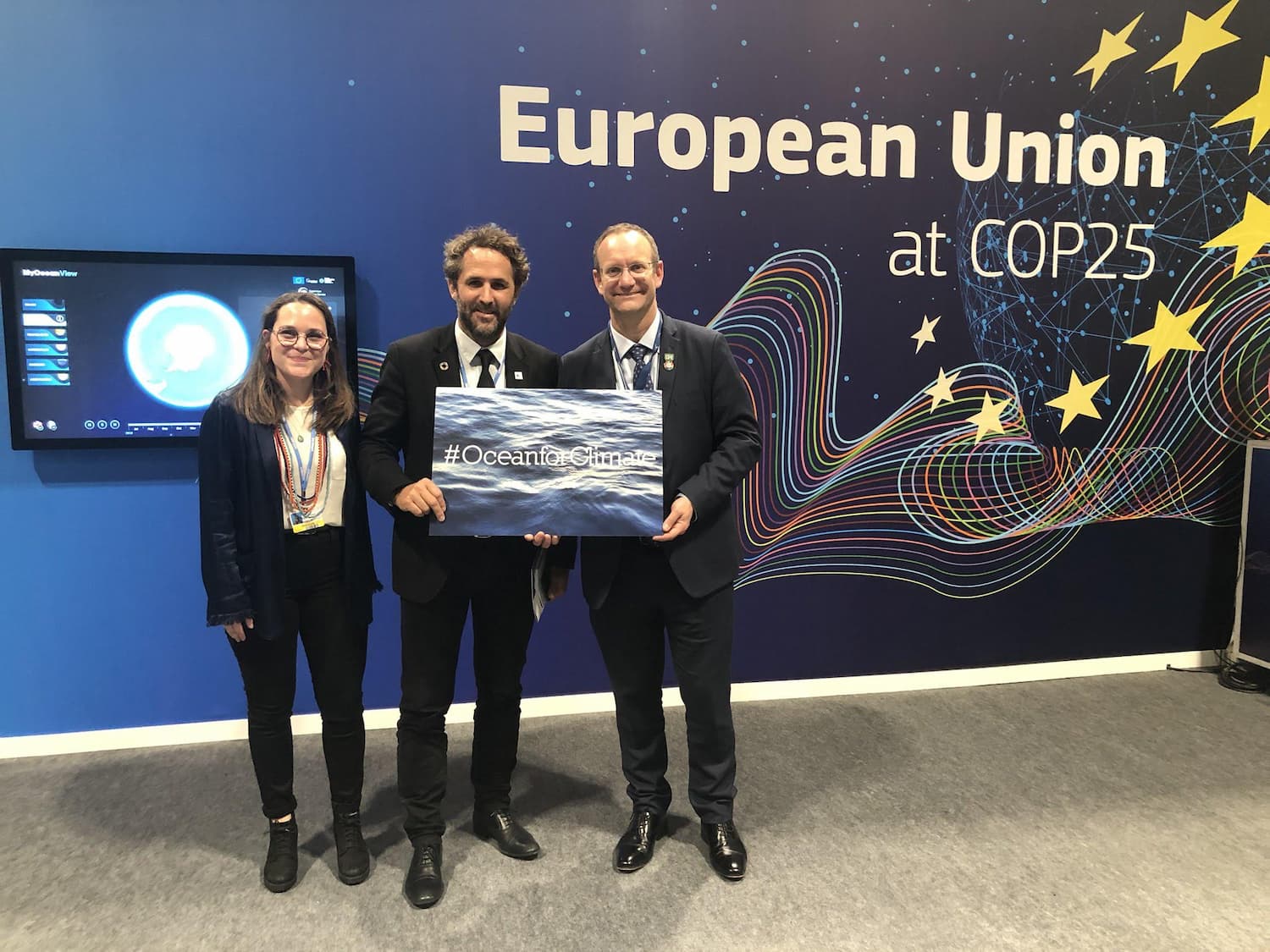
In the face of rising sea levels: An example of the Sea’ties Initiative
Sea’ties is an international initiative launched by the OCP that aims to facilitate the development of public policies and the implementation of adaptation strategies for coastal cities and territories facing the risks of sea-level rise.
Based on the principle that already implemented solutions can encourage and inspire coastal cities to adapt, the initiative mobilizes and connects experts and decision makers from 5 regions of the world (Northern Europe, Mediterranean, North America, West Africa, Asia-Pacific) representing a diversity of climatic, geographical, socio-economic, political and cultural conditions. Sea’ties organizes a series of regional workshops bringing together scientific experts, decision makers, elected officials, and civil-society representatives to identify issues, share local good practices, and ultimately produce policy recommendations.
These workshops are complemented by research work supported by a multidisciplinary working network (RTPI-Sea’ties) whose studies have led to the establishment of an archetype of adaptation solutions according to the modality of governance and the degree of complexity. Sea’ties also makes available a map of solutions to managers willing to initiate the transition of their territory. This online map identifies adaptation responses already implemented worldwide, highlighting good practices and vigilance points.
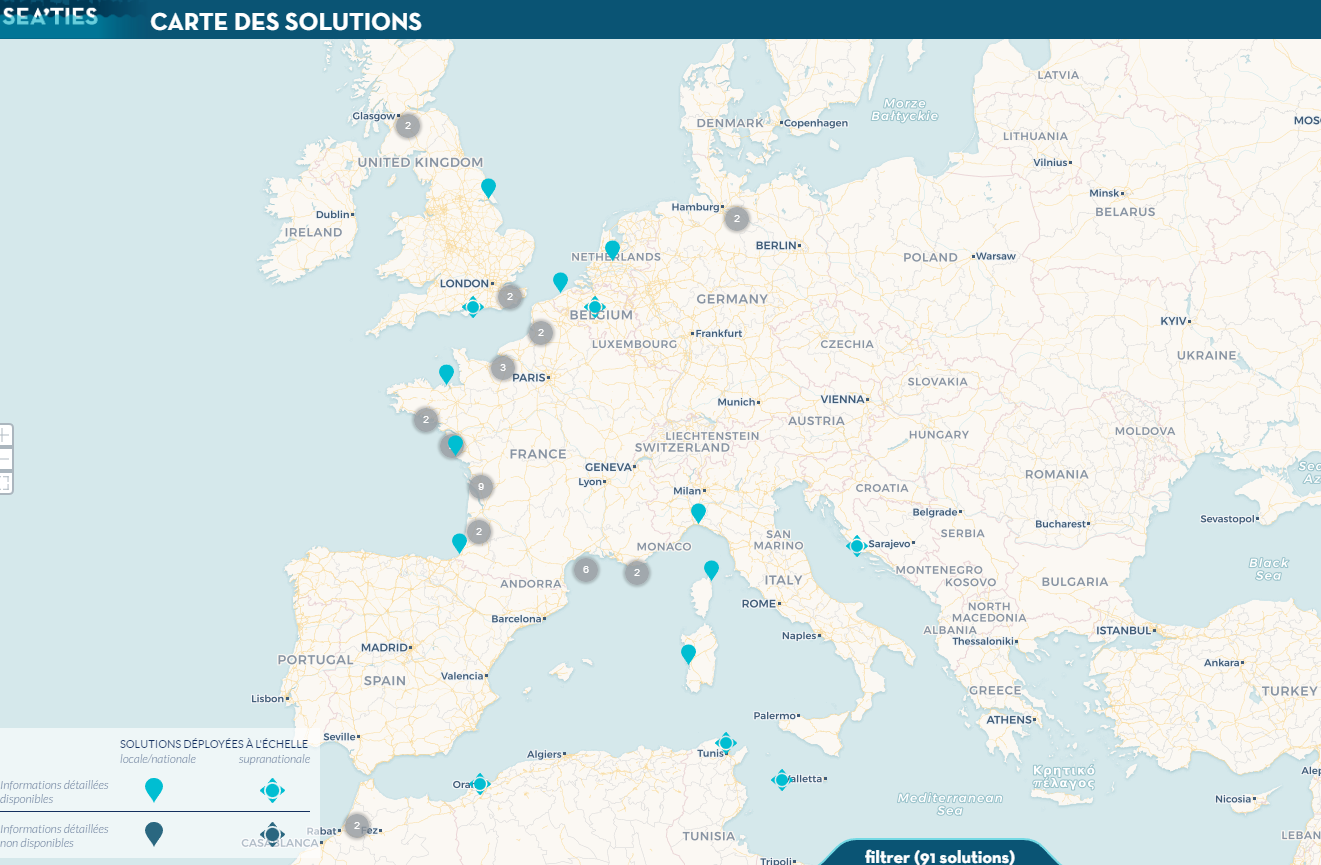
Finally, the initiative works towards the integration of adaptation challenges to climate change facing coastal cities into the international agenda. At the One Ocean Summit in February 2022, the initiative launched, in partnership with the French government and the city of Brest, the Sea’ties Declaration. Signed by more than 40 mayors and governors of coastal cities around the world, the declaration calls for accelerating the transformation of cities and territories around 4 priority action strategies:
- mobilization of scientific knowledge and observation systems
- integration of societal challenges into adaptation plans
- valorization of adaptive and hybrid solutions
- increased public funding and private investment for adaptation.
Sea’ties in Venice
On the occasion of the One Planet Polar Summit organized by France in November 2023, the President of the Republic announced the launch of the Ocean Rise & Resilience Coalition. Chaired by Christian Estrosi, the current mayor of Nice, it aims to bring together coastal communities within a coalition hosting more than one billion people across all continents threatened by rising sea levels, and to structure their action around three themes: scientific cooperation and disaster prevention; decentralized cooperation between communities; and the mobilization of multilateral and private funding to carry out the necessary actions to address this challenge.
This initiative is part of the organization, for the very first time, of a Summit of Coastal Cities and Regions of the world alongside the 3rd United Nations Ocean Conference, UNOC, in Nice in June 2025. Co-organized by France and Costa Rica, this global and foundational event for the future of the Ocean is expected to bring together nearly 120 heads of state and government and more than 20,000 representatives around a historic agreement for the protection of the Ocean.
Through its declaration, the interests of Sea’ties and this Ocean Rise & Resilience Coalition converge around the goal of facilitating the development and implementation of adaptation responses for coastal cities exposed to sea level rise through field experiences, scientific expertise, and networking of stakeholders. On June 8, 2024, on the occasion of World Ocean Day and the stopover of the schooner Tara in Venice, the mayor of the city Luigi Brugnaro signed the Sea’ties Declaration, thus making the city of Venice a member of the Ocean Rise & Resilience Coalition.
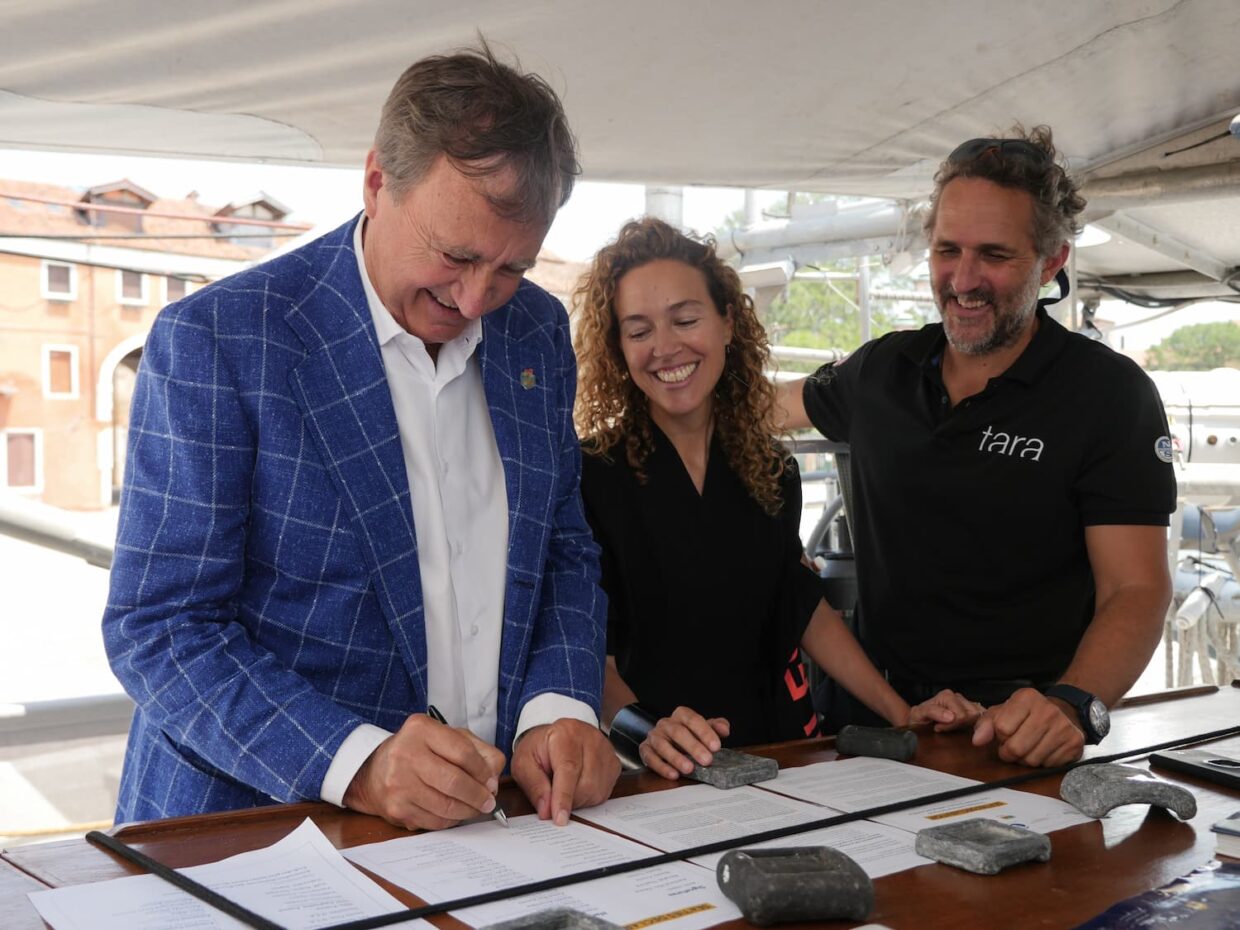
Communication as a lever to raise public awareness about ocean-related issues
The OCP is aimed primarily at policymakers and experts. To this end, it is very active on social networks (Twitter, LinkedIn), and regularly produces reports, articles and policy briefs on ocean-climate-biodiversity themes. In 2022, the OCP also launched the OCEAN exhibition, designed for the general public. It is an immersive experience that invites the spectator to plunge into the heart of the ocean, thanks to a visual scenography. A dome amplifies even further this experience with the 360° projection of the film “Le cœur battant de l’Océan,” (the Ocean’s beating heart), in which 12 people attest to their connection with the ocean. An unforgettable experience
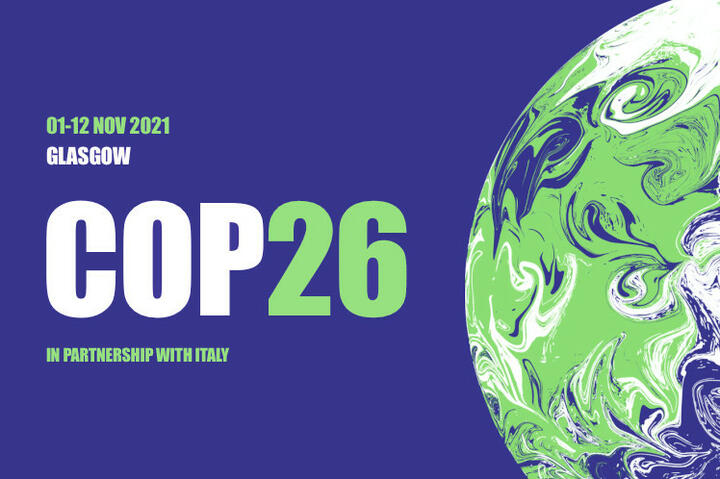
[COP26] Making the ocean our best ally in the fight against climate change
More than ever, it is crucial to integrate the ocean into the climate agenda and support initiatives designed to preserve marine biodiversity in the complex set that are conferences on climate change.
